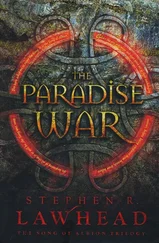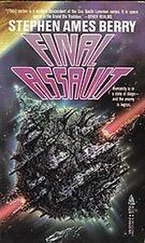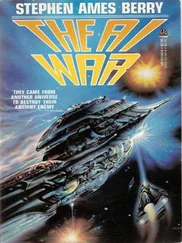Stephen Berry - The Biofab War
Здесь есть возможность читать онлайн «Stephen Berry - The Biofab War» весь текст электронной книги совершенно бесплатно (целиком полную версию без сокращений). В некоторых случаях можно слушать аудио, скачать через торрент в формате fb2 и присутствует краткое содержание. Жанр: Фантастика и фэнтези, на английском языке. Описание произведения, (предисловие) а так же отзывы посетителей доступны на портале библиотеки ЛибКат.
- Название:The Biofab War
- Автор:
- Жанр:
- Год:неизвестен
- ISBN:нет данных
- Рейтинг книги:5 / 5. Голосов: 1
-
Избранное:Добавить в избранное
- Отзывы:
-
Ваша оценка:
- 100
- 1
- 2
- 3
- 4
- 5
The Biofab War: краткое содержание, описание и аннотация
Предлагаем к чтению аннотацию, описание, краткое содержание или предисловие (зависит от того, что написал сам автор книги «The Biofab War»). Если вы не нашли необходимую информацию о книге — напишите в комментариях, мы постараемся отыскать её.
The Biofab War — читать онлайн бесплатно полную книгу (весь текст) целиком
Ниже представлен текст книги, разбитый по страницам. Система сохранения места последней прочитанной страницы, позволяет с удобством читать онлайн бесплатно книгу «The Biofab War», без необходимости каждый раз заново искать на чём Вы остановились. Поставьте закладку, и сможете в любой момент перейти на страницу, на которой закончили чтение.
Интервал:
Закладка:
"Where are we now?" John asked, pushing away the chicken Kiev and pouring himself another glass of Chateau Lafite-Rothschild 1947.
"Colonial Service's first Operations center on the planet. One of the better port facilities on Terra and a natural trading center. You are two miles below the Isle of Manhattan."
Despite the wonder of it all, excited talk soon gave way to nodding heads and slurred syllables: food, drink and exhaustion combined to send the humans, singly and in groups, filtering from the dining area to their rooms.
Leaving hand in hand, John and Zahava were almost to their door when POCSYM asked, "Care for a history lesson?"
"Not tonight," said Zahava as the door slid open. "We're tired."
"I can instruct as you sleep. Subliminal teaching is both effective and painless."
"Fine," said John, following Zahava into the room. "See you in the morning-or whatever." The door closed.
"Pardon my Jewish paranoia," Zahava whispered a few minutes later, slipping her dark nakedness into John's bunk, "but is POCSYM our only ticket out of here?"
"Sure sounds like it," he said, sliding a hand down her slim back till it rested atop a soft, round cheek. He gave a fond squeeze. "I didn't see an exit sign. We'd best be nice to him… it."
"You're supposed to be exhausted," Zahava said as John's other hand came into play.
"Most of me is," he confided, pulling her on top of him.
"Satyr," she whispered huskily as his hands caressed her.
The lights dimmed discreetly out.
Stephen Ames Berry
The Biofab War
Chapter 13
Huge, silent, the ships landed at night, far from the great river valleys with their rude villages. Disgorging armies of men and machines, they left-all but three.
It was a task of years before flaring energy beams and deep-set atomics finished the enormous caverns that would house the Project. By then the Staff had begun.
Men would disappear from their hovels, reappearing months later to speak slowly and strongly of new ideas, new gods, of better ways to live. At first some of them were killed, denounced as heretics, witches, devils. But most lived on to change the lives of their peoples. And once it was known that those who opposed the new men died-always of natural causes-effective resistance ceased.
The seed had been sown.
Through the centuries it was carefully nurtured and cultivated, becoming the root from which civilization sprang. The arts and sciences came into being and flourished. Temples and monuments were raised. Priesthoods and dynasties were founded, growing into greatness. The time for cross-fertilization had come.
Trade, before confined to land and coastal routes, now spread across the great waters, aided by new discoveries and navigation: devices that always showed a true heading, and simple instruments to determine position by sun and stars.
Often, touching upon some strange new shore, the mariners found their gods already there, housed in familiar small temples. And nearby hunters, farmers and fishermen, friendly and eager to trade.
Among the natives there lived, invariably, one man who spoke the mariners' language and knew their customs: the village shaman, versed in the ways of the gods the two peoples found they shared.
Goods and ideas flowed smoothly, the seafarers sharing the techniques of the Bronze Age with the landsmen. Their culture came, over the centuries, to resemble more and more that of the mariners.
Bonds of kinship developed through intermarriage. What often began as an arrangement between two peoples would become a trading confederation, expanding until it met other confederations with similar origins. In time, these allied confederations bound a continent. All prospered.
East across the ocean went gold, copper, silver, furs and hides. West came bronze tools, weapons, luxury goods.
An objective analysis of this cultural melding would have shown that at each critical stage, either a shaman in the West or a high priest in the East-or both-served as a catalyst. But the only social scientists around were themselves orchestrating the process.
The time came, at last, to begin the next Phase: technological refinements designed to tighten the bonds between East and West, eventually urbanizing the westerners. Steam engines and storage batteries were "invented" simultaneously in several eastern kingdoms. Before they could be refined, however, the Recall came.
It was the Senior Developmental Anthropologist's final year of his twenty-year tour on the planet. He took pride in the fact that of all preceding S.D. A. 's, his was one of only three stewardships under which a Phase had begun. The preparation had taken a long, hard decade. He was looking forward to his return to D'Lin, headquarters of the Colonial Service, and a well-earned retirement to a small, verdant archipelago on a water world of Sector Yellow.
The anthropologist, whose name was R'Garna, looked up, startled at the four beeps preceding an emergency subspace message. A holograph of the Colonial Minister, his face lined and haggard, filled the wall.
"This is a general address message." Despite a distance of hundreds of light-years, the equipment faithfully recreated his exhausted tone. "All stations, all sections, all commands will cease operations at once and fall back to D'Lin.
"Rebel forces have overrun all but Sectors Green and Yellow. Use extreme caution-the loyalty of all forces but the Home Fleet is in doubt. God save the Emperor. Good luck." His image dissolved.
R'Garna sighed deeply, sadly shaking his balding head. Old age had finally caught up with the K'Ronarin Empire. Sector governors had been seceding-successfully-for the past fifty years. The Recall could only mean that last month's rumor of a savage mauling of the Home Fleet by Z'Kalan rebels under ex-Governor S'Tren was true.
As a social scientist, the S.D.A. saw no end to the accelerating collapse of Pax Galactica. Anarchy would reign, and then would begin a long, painful climb back to the stars. He'd been careful to keep this opinion from the omnipresent ears of Security.
R'Garna knew also, as a veteran of two multifleet "police actions," that should he live to reach D'Lin, his reserve commission would be quickly activated. He had grave doubts about ever seeing his lush archipelago.
POCSYM hurled the two ships from their rocky wombs, deep into space. From there they began the first of a series of homeward-bound jumps, some through the middle of rebel sectors. Months later, badly shot up, one of them would limp into besieged D'Lin, half her complement dead. R'Garna's ship didn't make it.
Its masters gone, POCSYM placed all but its own considerable equipment in stasis, against the day of their return. It then turned to monitoring the Recall's effect on the plans and work of centuries. It didn't like what it saw, but was forbidden to intervene.
Lack of speedier transportation prevented a massive infusion of new blood from the West into the atrophying social structures of the East. Losing their vitality, the old dynasties fell to the brash young neighbors they'd before controlled with ease. Trade ceased and the tall ships went out no more.
In the West, the prosperity brought by the mariners departed with them. The confederations disintegrated. Tribes bickered and fought, some slipping back to a semi-nomadic existence, others descending into the barbarism of human sacrifice. All fell easy prey, much later, to eastern men who no longer came in peace.
POCSYM detected the S'Cotar fleet when it first came out of hyperspace. It activated its defenses and waited-this was a problem it could confront.
When the aliens were within easy range, POCSYM casually transported all ships to the same half mile of space.
It did so with the next two fleets that appeared over the next decade. There was an interlude of peace.
Читать дальшеИнтервал:
Закладка:
Похожие книги на «The Biofab War»
Представляем Вашему вниманию похожие книги на «The Biofab War» списком для выбора. Мы отобрали схожую по названию и смыслу литературу в надежде предоставить читателям больше вариантов отыскать новые, интересные, ещё непрочитанные произведения.
Обсуждение, отзывы о книге «The Biofab War» и просто собственные мнения читателей. Оставьте ваши комментарии, напишите, что Вы думаете о произведении, его смысле или главных героях. Укажите что конкретно понравилось, а что нет, и почему Вы так считаете.












